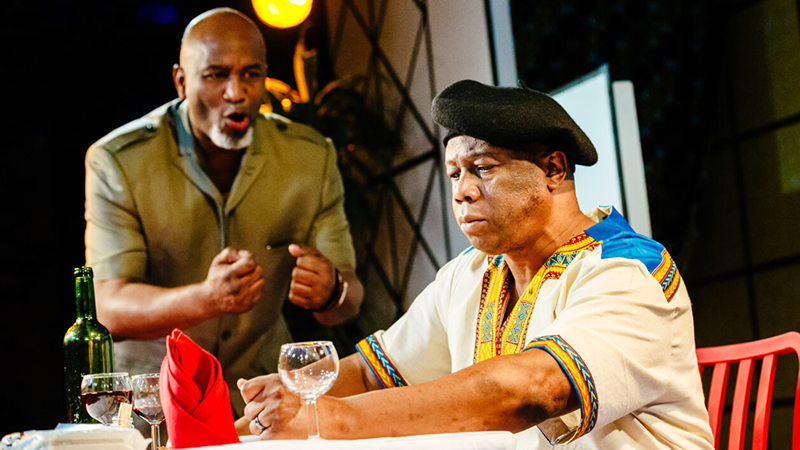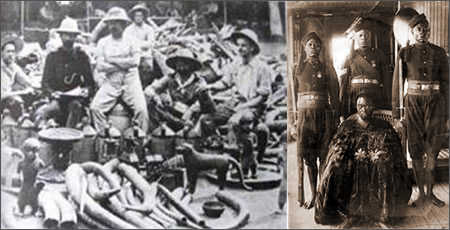This is the second film in Ligali’s Maisha series was filmed on three continents – Africa, Europe and the Americas. It has a strong focus on some of the solutions we can implement from learning from the structures we had in the past and adapting them to address and alleviate our current condition.

The documentary starts in Senegal on Goree Island, the doorway for many Afrikans exported to the Americas to the horrors of American and Caribbean slave plantations. The section titles give clear insight into the themes – Defending Africa From A History of War; Memory Loss and the African Identity; Guiding Children by Nurturing Talent and Parenting With Discipline; The Growth of Alternative Schools and the Home Education Movement for Independent Learning; The Social and Spiritual Responsibility of the Artist; Traditional Healing Solutions for Positive Mental Health; How Traditional Family Living in a Natural Environment Leads To Positive Health and Well-being; and The Political and Cultural Importance of Language.
Contributors felt that the scramble for Afrika and the war against the political, economic and cultural development of Afrikan and the war on the Afrikan’s psyche was continuing relentlessly. As Diallo Diop, Secretary-General of the RND in Senegal pointed out of the 14 most important raw materials Africa is the main provider in 13 and an important provider of the 14th so the world is not about to see Afrikan control in any way that denies them unfettered access to their lifeblood.
There is extensive use of archive footage and music throughout the DVD and surely one of the most prescient must be where members of Zoe’s Ark from France are caught kidnapping 103 children in Chad. The group falsely claimed they were orphans form Darfur when in fact many had parents in Chad. They had told the children’s parents and guardians that they were taking them to schools in neighbouring towns but intended to fly them to Europe where adopters (and no-doubt paedophiles) were desperately waiting to get their hands on them. As I watched this DVD the story of another group of Euro-American Christians kidnapping 33 Haitian children was unfolding. There the group had scoured orphanages and hospitals looking for children to kidnap. When that proved unsuccessful they eventually duped local villagers into handing over their children. The lawyer for the group, New Life Children’s Refuge, admitted the group knew they needed official approval in writing to remove children but they did not have it. Under UN rules you must wait for two years after a disaster to remove children to allow enough time to conduct an exhaustive search for relatives and explore all in-country options.
Shaka Marday hits the button when he points out the role of language as a vehicle for culture, ideas and ideology. And there is hope for future generations in the passion of Humani Eniolomunda, headmistress of Parkside Prep School, who refuses to give up on any child who comes through her doors. Still, for too many Afrikans, Malcolm X’s speech on poor life chances continues to ring true nearly half a century on.
Written by Kubara Zamani

External Links
Order: Maisha Solutions

DVD: Maisha Solutions
Contributors felt that the scramble for Afrika and the war against the political, economic and cultural development of Afrikan and the war on the Afrikan’s psyche was continuing relentlessly. As Diallo Diop, Secretary-General of the RND in Senegal pointed out of the 14 most important raw materials Africa is the main provider in 13 and an important provider of the 14th so the world is not about to see Afrikan control in any way that denies them unfettered access to their lifeblood.
There is extensive use of archive footage and music throughout the DVD and surely one of the most prescient must be where members of Zoe’s Ark from France are caught kidnapping 103 children in Chad. The group falsely claimed they were orphans form Darfur when in fact many had parents in Chad. They had told the children’s parents and guardians that they were taking them to schools in neighbouring towns but intended to fly them to Europe where adopters (and no-doubt paedophiles) were desperately waiting to get their hands on them. As I watched this DVD the story of another group of Euro-American Christians kidnapping 33 Haitian children was unfolding. There the group had scoured orphanages and hospitals looking for children to kidnap. When that proved unsuccessful they eventually duped local villagers into handing over their children. The lawyer for the group, New Life Children’s Refuge, admitted the group knew they needed official approval in writing to remove children but they did not have it. Under UN rules you must wait for two years after a disaster to remove children to allow enough time to conduct an exhaustive search for relatives and explore all in-country options.
Shaka Marday hits the button when he points out the role of language as a vehicle for culture, ideas and ideology. And there is hope for future generations in the passion of Humani Eniolomunda, headmistress of Parkside Prep School, who refuses to give up on any child who comes through her doors. Still, for too many Afrikans, Malcolm X’s speech on poor life chances continues to ring true nearly half a century on.
Written by Kubara Zamani

External Links
Order: Maisha Solutions
Ligali is not responsible for the content of third party sites





Get involved and help change our world